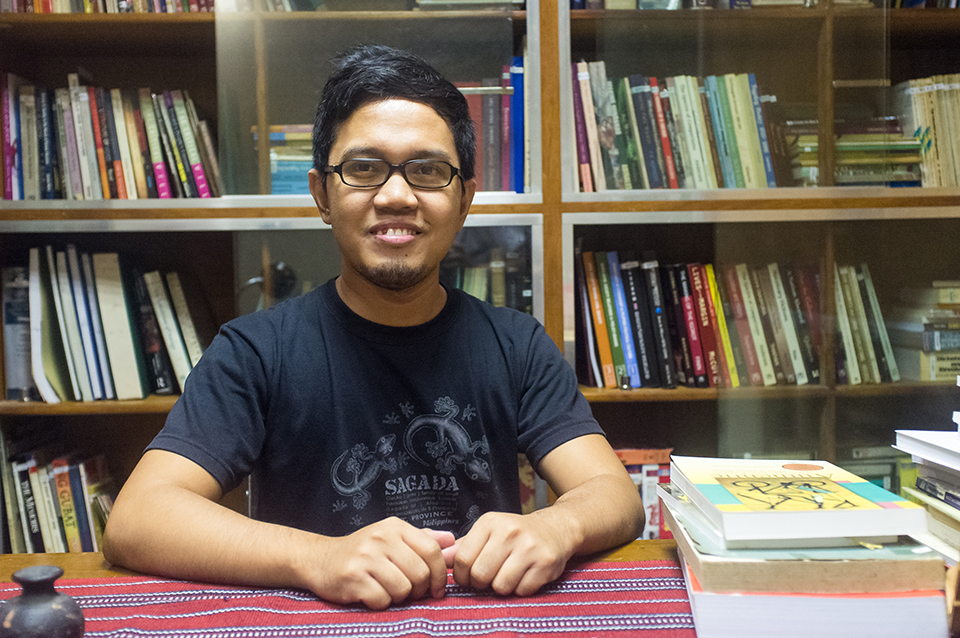One would expect Edgar Calabia Samar (AB Psy ‘02) to be a middle-aged man with a rounded belly and a slightly receding hairline. After all, one naturally imagines an award-wining author as a much older fellow, seasoned by decades of immersion in his craft.
In real life, however, this assistant professor from the Filipino Department looks more like a student. He arrives for his interview in sneakers and a gray polo with sleeves folded a quarter of the way up—if you didn’t know better, you could mistake him for someone in your theology class.
It’s this same man, however, who recently won two National Book Awards. Samar’s Sa Kasunod ng 909, a mystery thriller about a fresh graduate named Eman looking for the remains of his friend, received the Juan C. Laya Prize for Best Novel in a Philippine Language. On the other hand, his book Halos Isang Buhay: Ang Manananggal sa Pagsusulat ng Nobela, a companion to Sa Kasunod ng 909, won the Isagani R. Cruz Prize for Best Book of Literary Criticism or Literary History in a Philippine Language.
That’s the thing about Samar—he’s always catching people off-guard. He seems unassuming at first glance, but you’re never quite sure what you’ll get out of him.
Origin story
Samar has been catching people by surprise long before he picked up the pen. Having topped an aptitude test administered to all the preschool children in Laguna, his family decided to send him to Ateneo de San Pablo instead of a state-run public school.
“Sabi ng mga tito ko… nanghinayang sila na mag-public school ako (My uncles said they felt uncomfortable about sending me to a public school),” shares Samar, who comes from a family of modest means. “Pinilit nila na makapasok ako sa isang private na Catholic school (They found a way for me to attend a private Catholic school).” He puts emphasis on the word “Catholic.”
He then segues into a story about a side of himself few others are aware of: Edgar Samar the altar boy. He recounts how he was raised in a deeply religious household and how his family pushed him into being a sacristan for a few years.
Despite the fact that he wasn’t there by his own volition, Samar didn’t find the job all that dreary. “Parang buong time na nagsasakristan ako, everytime na may Mass at andun ako, lagi nasa isip ko lang ay gusto ko patunugin ‘yung bell sa moment na hindi siya dapat patunugin (The entire time I was a sacristan, every time I was at a Mass, I was always thinking about how much I wanted to ring the bell at the wrong time),” recalls Samar with a chuckle.
Evidently, a life at Church wasn’t for Samar, but a life immersed in writing was another thing entirely. He says he had a keen fascination with the pen ever since he was young; he entered different writing contests in elementary and was elected as his high school paper’s first ever editor-in-chief.
Samar also won awards in journalistic competitions, making him a relatively familiar name in his native Laguna. “Dahil nanalo ako [sa paligsahan], ininvite ako ng mga matagal na newspapers na nakabase sa San Pablo (Because I won the competition, I got invited to write for newspapers that have long been based in San Pablo),” shares Samar, who wrote weekly columns for Laguna’s Wednesday Herald and Southern Tagalog Herald.
Passing on the pen
By the time he entered college, however, Samar admits that he was more interested in long-form fiction than journalism. But in the Ateneo de Manila University—a school he chose over the University of the Philippines because of its strong foundation in the humanities—he became involved in Heights, the Ateneo’s official literary and artistic publication. There he was drawn toward poetry.
His interest, however, didn’t immediately translate into skill. He sheepishly recounts the time he submitted 40 different pieces under different pseudonyms. Out of the 40, only one was accepted for publication.
“Enlightening din sa akin yung experience; naririnig mo nagkokomment [ang members] sa work mo kung nagustuhan ba nila o hindi (I still found the experience enlightening; I heard the members commenting on whether or not they liked my work),” he recalls.
Today, Samar is still in the Ateneo, teaching, primarily because he doesn’t think that the type of writing he wants to do can provide a stable livelihood. He shares that it’s also important to him as a writer to be able to impart his fascination with the world of literature with his students.
Allan Derain, Samar’s close friend and colleague at the Filipino Department, finds Samar’s generosity one of his defining traits. “One really concrete manifestation of his generosity is that he’s willing to open his house to us whenever we want to have a [writing] workshop,” says Derain in a mix of English and Filipino.
A tale of tomorrow
Most of Samar’s works are written in Filipino. The use of the language came naturally to him, he explains, adding that he feels a certain responsibility for making great works in his first language.
He soon discovered however, that what felt natural to him wasn’t the norm everywhere else. As he repeatedly reminds his students, an author always has a predetermined audience, because of the language he or she chooses.
“Hindi ito katulad ng dance, visual arts, music, na wala ‘yung concern [ng predetermined audience] kasi kahit sino makapanood sa iyo, masasabi niya kung nagandahan siya o hindi (Writing isn’t like dance, visual arts or music, which aren’t concerned about a pre-determined audience, wherein anyone who views your work can say whether he liked it or not).”
Ironically, Samar was more interested in the field of visual arts once. He shares that he would regularly read the comics from the Filipino weekly magazine Liwayway as a child. “Once you realize that you don’t have talent for the visual arts, your resort is to move into writing,” Samar jokes in a mix of English and Filipino. He explains that once he realized that there were so many others who could draw better than him, he decided to improve his writing instead.
His background in comics, however, still shows through in his work. Back in 2003, for example, he wrote the children’s story “Uuwi na ang Nanay Kong Si Darna,” which focused on a young boy named Popoy, who was told that his mother was the superhero Darna.
“Madami akong gusto isulat (There are so many things that I want to write),” Samar says when asked about his plans for the future. Aside from working on the second installment of his upcoming young adult series, Samar also said that he is currently penning the third book in his Trilogy of Numbers series, of which Sa Kasunod ng 909 is part. With a grin, he mentions that this third novel will be entitled Pu*a—asterisk intended.
Samar, it seems, isn’t prepared to waste a single minute. As he puts it, “The important thing is that you know you’re being productive.” In the end, though, Samar says everything he does is about making the most of what he has. “Perhaps you can say that I strived to excel with what has been given to me.”








[…] ito sa artikulong “Wordplay: Edgar Calabia Samar” na isinulat nina Javison T. Guzman at Kian L. Paras para sa The Guidon noong 26 Disyembre […]
[…] ang nobela sa artikulo ng The Guidon na “Wordplay: Edgar Calabia Samar” na nalathala noong 26 Disyembre […]